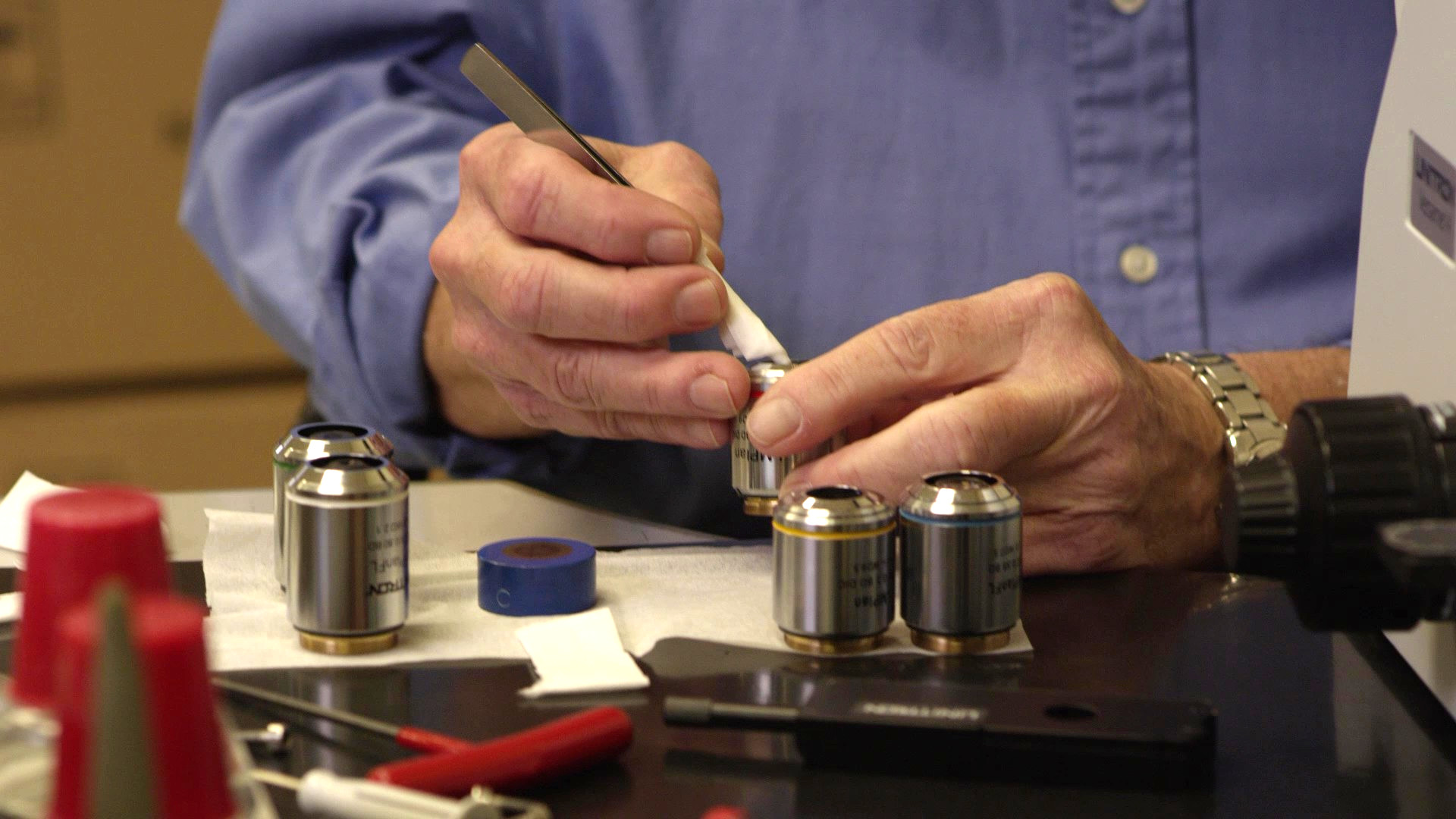Microscopes are invaluable tools in scientific research, medical diagnostics, and industrial applications. To ensure they provide accurate and reliable results, routine maintenance is essential. Proper care extends the life of the instrument, maintains image clarity, and prevents costly repairs. This article highlights the key aspects of microscope maintenance, including routine cleaning, annual performance checks, and professional servicing by factory-authorized technicians.
Routine Cleaning: Preserving Optical Clarity and Performance
Regular cleaning is critical to maintaining the integrity of your microscope. Dust, fingerprints, and oil buildup can degrade image quality and affect the overall performance of the instrument. Proper cleaning should focus on three main areas:
- Optics: The objective lenses, eyepieces, condenser and field lens should be cleaned using a soft, lint-free cloth or lens paper with a small amount of lens-cleaning solution. Avoid using harsh chemicals or touching the optics with bare fingers, as oils from the skin can damage coatings over time.
- Stage: The stage should be kept free from dust, debris, and residual samples. After use, wipe it down with a dry or slightly damp cloth to prevent contamination. For a cleaning solution, use a mild detergent in water. If residue remains, use some rubbing alcohol – be sure not to contact any rubber or plastic surfaces with alcohol or other solvents.
- Frame: The body of the microscope should be wiped down regularly with a clean, dry cloth. When needed, use a soft, clean cloth slightly dampened with a mild detergent in water to clean the surface of the microscope body, focus knobs and stage control knobs. DO NOT SATURATE the microscope.
- Contact a Professional when mechanical operation is not smooth. Cleaning the focus and stage operation components requires expertise to return the microscope to proper working order and avoid damage to the moving mechanisms.
Annual Performance Checks: Prevent Issues Before They Arise
Routine daily cleaning is essential, but an annual performance check ensures that all components function optimally. During these checks, key areas to evaluate include:
- Alignment and Calibration: Proper alignment of optical components is crucial for accurate imaging. Misalignment can lead to aberrations and incorrect measurements.
- Mechanical Functionality: Ensure that the stage moves smoothly, focus adjustments are precise, and there is no excessive wear on moving parts.
- Illumination System: The light source should be bright and even. If bulbs or LEDs appear dim or flickering, they may need to be replaced.
- Optical Clarity: Regularly checking for any scratches, dirt, or damage to the optics helps maintain high-quality imaging.
By performing an annual inspection, users can identify and address minor issues before they become major problems.
Professional Servicing: The Value of Factory-Authorized Technicians
While routine maintenance can be performed in-house, there are instances where professional servicing is necessary. Factory-trained technicians have the expertise and tools required to handle complex repairs and calibrations. Key benefits of professional servicing include:
- Expert Repairs and Adjustments: Trained professionals can diagnose and fix mechanical or optical issues that may not be apparent to the user.
- Access to Parts: Factory-authorized professionals have the knowledge to know what components need to be replaced, plus they have the access to obtain those parts.
- Software and Firmware Updates: Many modern microscopes include digital imaging systems that require updates to maintain compatibility and performance.
- Warranty Compliance: Using authorized service providers ensures that repairs and maintenance adhere to manufacturer specifications, keeping warranties intact.
- Extending Equipment Life: Regular servicing helps prevent premature equipment failure, reducing the need for costly replacements.
Wrap Up
Proper microscope maintenance is essential for ensuring precision, reliability, and longevity. By following routine cleaning practices, conducting annual performance checks, and relying on factory-authorized technicians for servicing, users can maintain their microscopes in peak condition, extend the life of their investment and ultimately gain better value over time.
ACCU-SCOPE offers in-house microscope service, and we can recommend service providers closer to your location. If you think your microscope needs service, visit our service contact page: https://www.accu-scope.com/support/find-a-service-center/
